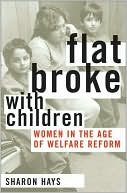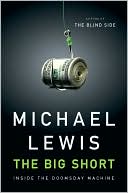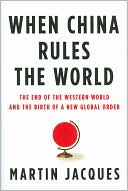Flat Broke with Children: Women in the Age of Welfare Reform
Search in google:
Hailed as a great success, welfare reform resulted in a dramatic decline in the welfare rolls—from 4.4 million families in 1996 to 2 million in 2003. But what does this "success" look like to the welfare mothers and welfare caseworkers who experienced it? In Flat Broke With Children, Sharon Hays tells us the story of welfare reform from inside the welfare office and inside the lives of welfare mothers, describing the challenges that welfare recipients face in managing their work, their families, and the rules and regulations of welfare reform. Welfare reform, experienced on the ground, is not a rosy picture. The majority of adult welfare clients are mothers—over 90 percent—and the time limits imposed by welfare reform throw millions of these mostly unmarried, desperate women into the labor market, where they must accept low wages, the most menial work, the poorest hours, with no benefits, and little flexibility. Hays provides a vivid portrait of their lives—debunking many of the stereotypes we have of welfare recipients—but she also steps back to explore what welfare reform reveals about the meaning of work and family life in our society. In particular, she argues that an inherent contradiction lies at the heart of welfare policy, which emphasizes traditional family values even as its ethic of "personal responsibility" requires women to work and leave their children in childcare or at home alone all day long. Hays devoted three years to visiting welfare clients and two welfare offices, one in a medium-sized town in the Southeast, another in a large, metropolitan area in the West. Drawing on this hands-on research, Flat Broke With Children is the first book to explore the impact of welfare reform on motherhood, marriage, and work in women's lives, and the first book to offer us a portrait of how welfare reform plays out in thousands of local welfare offices and in millions of homes across the nation. Publishers Weekly While welfare reform in the mid-1990s meant new employees and equipment for some welfare offices and perks like interview clothing for some welfare recipients, it also meant harsh guidelines aimed at punishing welfare recipients who did not follow strict protocols. In Flat Broke with Children: Women in the Age of Welfare Reform, Sharon Hays, using her research from two towns, focuses on single mothers who have at least occasionally relied on welfare for support. She finds that they are often pushed into dead-end employment with no career stability, while the government's emphasis on "family values" encourages them to marry men who can support them. These mixed messages, put forth via a rigid bureaucracy, pull welfare recipients and well-intentioned case workers in multiple directions. Hayes's subjects tell stories of the extreme poverty, broken families, sexual abuse, homelessness, and the lengths to which they go in attempts to juggle multiple part-time low-paying jobs, but they do not portray themselves as victims.
AcknowledgmentsCh. 1Money and Morality3Ch. 2Enforcing the Work Ethic33Ch. 3Promoting Family Values63Ch. 4Fear, Hope, and Resignation in the Welfare Office95Ch. 5Pyramids of Inequality121Ch. 6Invisibility and Inclusion139Ch. 7Cultures of Poverty179Ch. 8The "Success" of Welfare Reform215Notes241References263Index281








